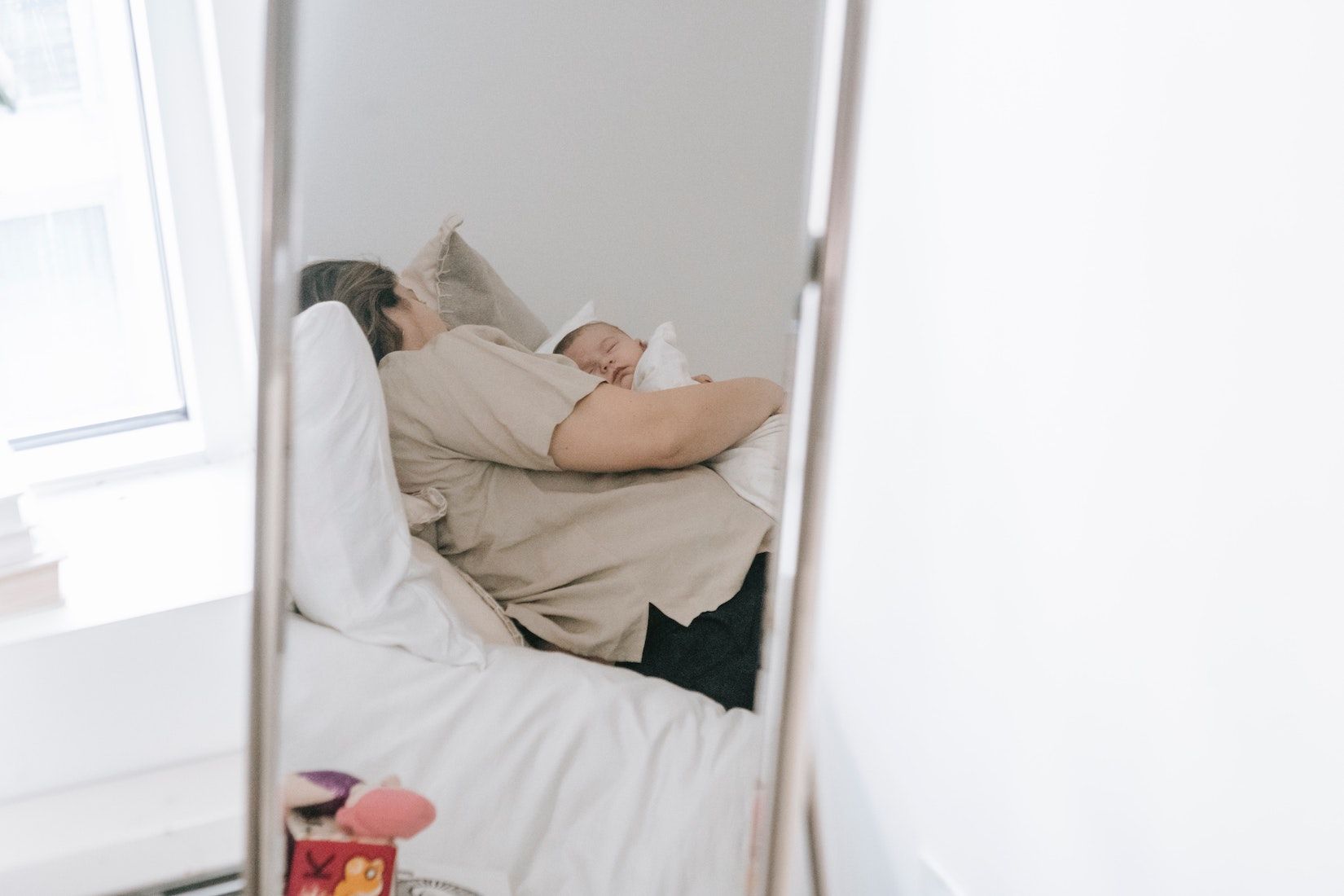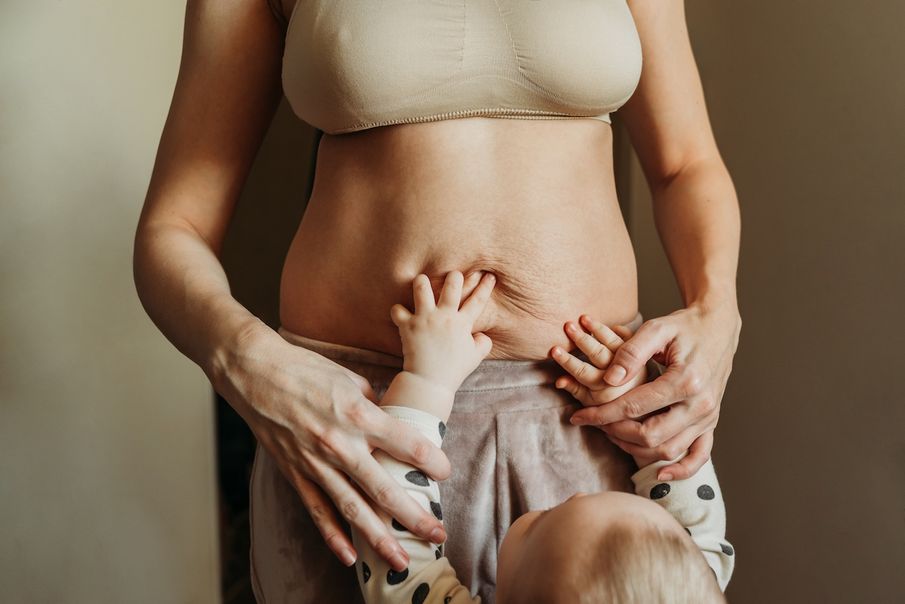Having a baby is truly life-changing, but it can also shift our relationship with our physical selves. From our wardrobe to our own identity, we look at our bodies in a whole new way after becoming a mum. Here, we explore how to find a better relationship with your body in the postpartum period
While everyone’s pregnancy journey is unique, for many mums-to-be it’s often a time when we feel empowered in our own skin. As we watch our bumps grow, we might marvel at just how capable the human body is (minus the morning sickness and heartburn, of course). One survey by Herbal Essences for its Pregnant Women Can campaign actually found that 65% of expectant mums feel more confident in their bodies than before they fell pregnant but, sadly, this isn’t always the way once the baby has safely arrived.
Part of this is down to societal pressure, with many mums reporting that they’re focused on ‘losing the baby weight’ soon after their child arrives. “An entourage of unrealistic post-baby pictures on social media can exacerbate feelings of dissatisfaction,” says psychotherapist Yvette Vuaran, with a survey by MoneySavingHeroes.co.uk finding that 80% of mums felt pressured to lose weight after having a baby, which, naturally, can negatively impact relationships with their bodies.
This pressure to return to their pre-baby self can leave mums struggling. Research published in the Journal of Reproductive and Infant Psychology revealed that mums with poor body image actually scored lower in terms of overall wellbeing, self-esteem, and even how competent they felt as a parent. So, the repercussions of this disconnect from our bodies and how they’ve adapted can be vast.
But, it doesn’t have to be this way, and, with the right support and guidance, mums can still feel confident in their own skin.
Why our bodies change after having a baby
First of all, let’s acknowledge that growing and birthing a human for nine months is a pretty huge achievement. Not only does a pregnant person’s body provide nutrients for their baby, but it physically adapts. As the baby grows and takes up more room, organs such as the liver and stomach are literally pushed upwards and displaced. Is it any wonder that this process leaves our bodies looking (and feeling) a little different?
The hormone changes that happen after childbirth also causes bodies to go through all sorts of changes – and some aren’t the most glamorous. For example, your oestrogen falls quickly, and this makes your hair shed much more obviously than usual. While those who breastfeed might notice this makes your skin feel super dry and flaky (this is because your body uses lots of water while you do it).
But it’s not just hormones that change your body; you may be dealing with physical changes too, such as stretch marks, tearing, or changes to your pelvic floor, impacting daily life. So, it’s no wonder that these differences take some time to adjust to, and while it might seem like you’re alone with these things, but the truth is you’re really not. In fact, up to 90% of first time mums will tear to some degree in vaginal childbirth, so don’t feel embarrassed into silence or not sharing when you’re struggling with this.

How our body relationship changes postpartum
All of this is a huge upheaval (and we haven’t even got to the part about living on three hours’ of sleep yet). Prior to having a child, personal achievements may have offered a confidence boost when you needed it most. For example, we might feel super strong after running a 5k, or really confident after smashing that work presentation. But after having a baby, most of us aren’t doing these things due to recovering, or being on parental leave. This can cause feelings of frustration, especially if we experienced a difficult birth, or a C-section has made physical recovery slow.
“After months of sharing our bodies with a baby or babies growing inside us, suddenly, through birth, we are met with a new reality,” says psychotherapist Yvette Vuaran. “This reality might be quite different from what we imagined. After giving birth, our bodies (and minds) carry the impact of change. How we perceive these changes affects our relationship with our bodies.”
How to embrace your body post-baby
Understanding these changes, and how they affect us, is really important. It might seem impossible at times, but there is a way to embrace this new part of life, and the body that comes with it. Here’s how you can start to love the skin you’re in after having a child:
Find support
You’re not the only mum feeling like this (we promise), and talking to others can help you to feel supported and move forwards. Local coffee mornings and playgroups are a great way to meet new parents who are often in the same boat. However, if your relationship with your new body is impacting your mental health, your GP or health visitor might also be able to refer you to specialist services, such as postnatal cognitive behavioural therapy.
In the UK, most new mums have a six-week postnatal check with their GP, and if physical changes are making life more difficult (such as pelvic floor problems or a C-section scar not healing), then it’s really important to flag these. “There is tremendous value in seeking support from a professional to help make peace with or love our new body, if this is of concern,” adds Yvette.

Use positive affirmations
Some gentle affirmations may act as helpful reminders, since self-affirmations have been proven to help body satisfaction in women, as demonstrated in a study in the Journal of Child Psychology and Psychiatry, and only take minutes to do.
“Try affirmations such as ‘I love myself as I am,’ ‘I accept my body as it is,’ or ‘I trust my body to do exactly what it needs to do,’” says hypnotherapist Geraldine Joaquim.
Lottie Reeves, a perinatal mental wellbeing practitioner, advises the use of affirmations that focus on what you’ve achieved, such as ‘My body has grown and nurtured a baby,’ ‘My body is still my own,’ and ‘I am basking in the glow of my new body and the smiles of my new baby.’
Adapt tasks rather than replacing them
It’s all about adapting to your new life, rather than never being able to do things you loved again. Yes, signing up to a 10k might be out of the question right now, but if exercise was your feel-good go-to, then signing up to a gentle mum and baby exercise class, or even a weekly pushchair stroll could make a big difference. If you loved spa trips pre-baby, could you find time one evening to pamper yourself at home?
Embrace your new wardrobe
One of the problems of the postpartum period is we can lose our sense of style; reaching for our comfy maternity clothes can feel like a setback, but holding on to pre-baby clothes that are no longer practical isn’t helpful.
Remember, clothes are made to fit your body, rather than trying to squeeze your body into old clothes. Treating yourself to new clothes for a new stage in your life is a great way to embrace your new body.
While having a baby is a huge change, it can come with a real appreciation of what our body is capable of. However, if you are finding things difficult, do reach out to professionals for extra support. You can find a list of useful organisations to support you via the NHS website, or speak to your GP or health visitor.
If you would like more information or support, visit the Counselling Directory or speak to a qualified counsellor.


Comments